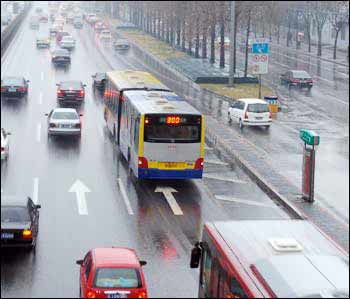| Home / 2007 NPC & CPPCC Sessions / Web Exclusives | Tools: Save | Print | E-mail | Most Read |
| Traffic Smooth Despite Rainy Opening of Sessions |
| Adjust font size: |
A chilly spring rain, coupled with the opening of the Fifth Session of the Tenth National Committee of the Chinese People's Political Consultative Conference (CPPCC), brought fears of mass traffic jams in downtown Beijing. However, the flow of cars remained smooth along major avenues, including Chang'an Avenue and the Second and Third ring roads, thanks to major traffic control measures that have been put into effect during the "two sessions" period, such as increasing bus transport capacity and private vehicle restrictions. The other session refers to the Fifth Session of the 10th National People's Congress (NPC) scheduled to begin on March 5.
A raincoat-clad city policeman at Tiananmen Square told China.org.cn, "On one hand, we are trying our best to keep the roads clear during the two sessions. On the other hand, we must minimize disruptions to normal life." "It is our duty! It is rainy and a little bit boring, but we feel very proud and glad," he added. According to the city's traffic management bureau, this is the first year it will inform the public of traffic routes to be cleared for the transport of two-session participants, who are shuttled between hotels and the Great Hall of the People, the venue of the sessions, by more than 800 special buses. This information aims to ensure smooth traffic for the meetings and reduce the disturbance to local residents, said an official with the bureau, which will release traffic control information on the radio, Internet, and outdoor screens. Often, general traffic must be temporarily halted, especially when NPC deputies and CPPCC members go to or leave the conference sites. During these times the public will have to stop and wait for a few minutes, but many do not complain about it. Fifty-one year old Ms Zhang traveling on the Bus No. 52, one of the busiest lines on Chang'an Avenue, told China.org.cn, "People in Beijing all understand the situation. The two sessions are one of the most important political events in China. It's okay for us to wait for a moment." Passenger Mr. Li also suggested that it would be better if traffic restrictions were not used at the peak travel times, especially when people rush to work. "It doesn't matter for us to wait when we go back home. But going to work is different. Maybe the deputies or members could leave their hotels earlier or later. That would be perfect!" he said with a smile. Mr. White, a senior leader from a foreign company in Beijing, talked with China.org.cn about previous traffic measures taken in the city. "Beijing can definitely offer good traffic conditions for big events," he said. "From last year's Beijing Summit of the Forum on China-Africa Cooperation (FOCAC) to this year's two sessions, all measures of the Chinese government proved that Beijing has this kind of ability." "I think it is a good test and also may provide very important experience in organizing major events for the Chinese government," he added. In addition, the Ministry of Public Security also ordered a clampdown on drunken driving from February 20 to March 5 to create a better traffic environment for the two sessions. The police have put restaurants, bars, and entertainment clubs in the surrounding areas under stakeout and been instructed to handle drunken driving cases strictly in line with traffic laws.
(China.org.cn by staff reporter Wang Ke, March 3, 2007) |
| Tools: Save | Print | E-mail | Most Read |
 |
| Related Stories |

